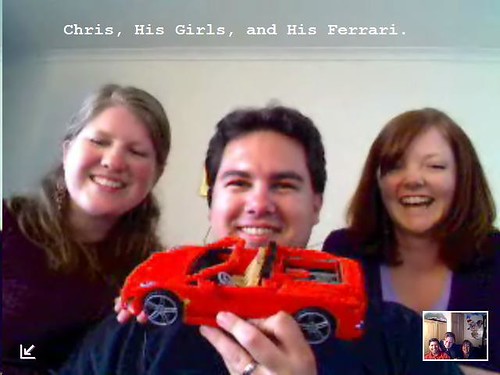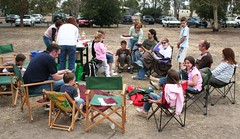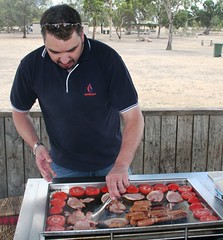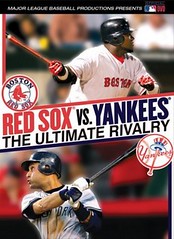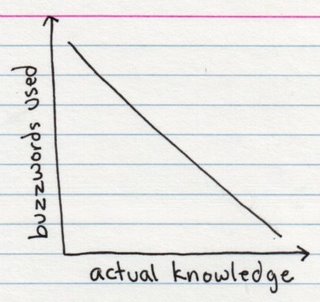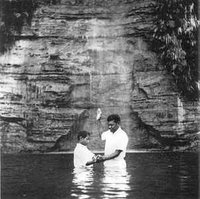
Saddam Hussein died today. He was executed in Iraq, his home, by his own people. He was hung by the neck, and he died. It brings up a lot of questions in the minds of Christians; how are we to treat our enemies? When is violence the answer? Is it ever?
I find myself questioning our logic, as of late, in regards to the many issues surrounding violence, killing, and maiming others intentionally. On the one hand, I see the logic in Hammurabi’s "eye for an eye" mentality, and in the MAD-tactics employed in relation to nuclear war. On the other hand, I also see Jesus referred to as the "prince of peace," and that he never raised his hand against anyone. He said things like "love your enemies" and "love your neighbor." Jesus was God incarnate, and so you'd think he'd have some authority on the subject. [MAD, by the way, means "Mutually Assured Destruction," and it means that if two countries both have nuclear weapons, it's fairly certain that neither will use them against he other, out of fear of total global annihilation. Nukes suck like that.]
So is violence ever ok? I suppose the question might be framed, "is violence ever an expression of love?" Putting it that way, it would seem obvious at first blush that no, violence is never an act of love ... is it? I know that it should seem obvious to me, but I feel sort of trapped by the question.
This is my conundrum: when is violence necessary to protect (out of love) the innocent? If a thief comes in the night to steal your coat, Jesus said to give him your shirt as well. But what about when the thief is stealing your child's shirt? What about the rapists, the pedophiles, the drug dealers who intentionally set out to harm our children and our wives? Is the instinct that tells me to throttle the guy trying to rape my wife a bad instinct? How about the psycho-killer intent on racking up a body count? That's one-on-one, but then think big - by ousting Saddam, a man who made his choices, and eliminating him, have we protected more people? Is it an act of love to try and give the people of Iraq their chance at determining their own future?
I see God do all sorts of nasty things in the Old Testament. I see God tell Israel to slaughter entire nations so that they, the chosen people, will not be "contaminated." They disobey, and later pay the price. I see the walls of Jericho come crashing to the ground, the populace slaughtered by the Israelites - at God's command. I see Gideon and a pithy little squad of farmers take on an entire army with a bunch of trumpets, a few rocks, and a lot of faith - and God ordered it. Even more, God wiped out almost the entire population of the planet in a great flood, saving the one faithful family that remained. Now we tell the story to our children because it has fluffy animals in it somewhere.
Then God says "thou shalt not murder".
And then, in the New Testament, God mops the floor with Ananias and Sapphira. They die. Killed by God, through Peter. That's violence, right? It wasn't even self-defense, it was punishment!
So I ask again, is violence ever appropriate?
I find myself questioning our logic, as of late, in regards to the many issues surrounding violence, killing, and maiming others intentionally. On the one hand, I see the logic in Hammurabi’s "eye for an eye" mentality, and in the MAD-tactics employed in relation to nuclear war. On the other hand, I also see Jesus referred to as the "prince of peace," and that he never raised his hand against anyone. He said things like "love your enemies" and "love your neighbor." Jesus was God incarnate, and so you'd think he'd have some authority on the subject. [MAD, by the way, means "Mutually Assured Destruction," and it means that if two countries both have nuclear weapons, it's fairly certain that neither will use them against he other, out of fear of total global annihilation. Nukes suck like that.]
So is violence ever ok? I suppose the question might be framed, "is violence ever an expression of love?" Putting it that way, it would seem obvious at first blush that no, violence is never an act of love ... is it? I know that it should seem obvious to me, but I feel sort of trapped by the question.
This is my conundrum: when is violence necessary to protect (out of love) the innocent? If a thief comes in the night to steal your coat, Jesus said to give him your shirt as well. But what about when the thief is stealing your child's shirt? What about the rapists, the pedophiles, the drug dealers who intentionally set out to harm our children and our wives? Is the instinct that tells me to throttle the guy trying to rape my wife a bad instinct? How about the psycho-killer intent on racking up a body count? That's one-on-one, but then think big - by ousting Saddam, a man who made his choices, and eliminating him, have we protected more people? Is it an act of love to try and give the people of Iraq their chance at determining their own future?
I see God do all sorts of nasty things in the Old Testament. I see God tell Israel to slaughter entire nations so that they, the chosen people, will not be "contaminated." They disobey, and later pay the price. I see the walls of Jericho come crashing to the ground, the populace slaughtered by the Israelites - at God's command. I see Gideon and a pithy little squad of farmers take on an entire army with a bunch of trumpets, a few rocks, and a lot of faith - and God ordered it. Even more, God wiped out almost the entire population of the planet in a great flood, saving the one faithful family that remained. Now we tell the story to our children because it has fluffy animals in it somewhere.
Then God says "thou shalt not murder".
And then, in the New Testament, God mops the floor with Ananias and Sapphira. They die. Killed by God, through Peter. That's violence, right? It wasn't even self-defense, it was punishment!
So I ask again, is violence ever appropriate?

